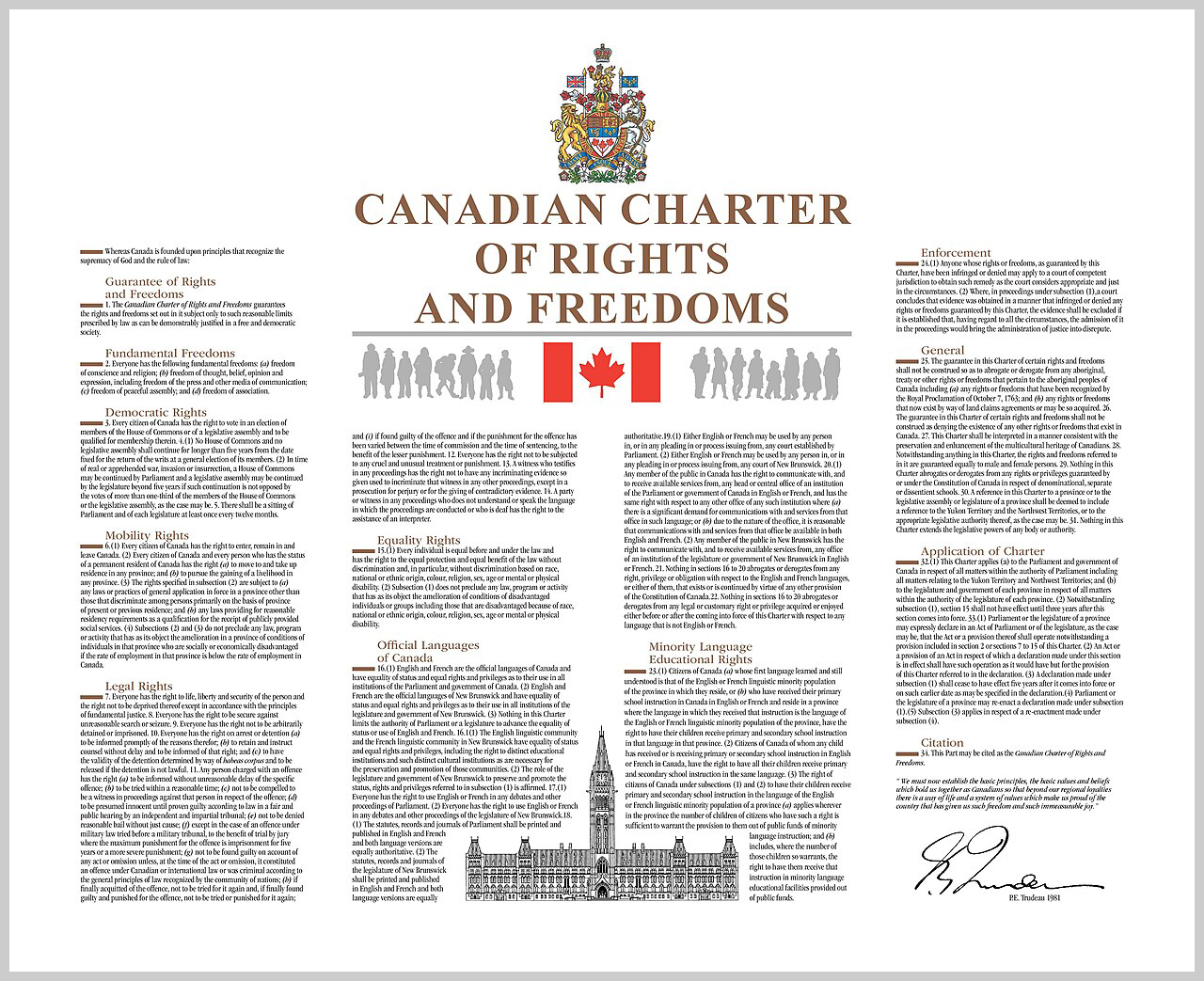Canadian Miranda Rights: Your Right to Remain Silent
The concept of “Miranda Rights” does not exist in Canada.
However, individuals in Canada have certain rights and protections when being arrested or detained by law enforcement officials. These rights are outlined in the Canadian Charter of Rights and Freedoms, which is part of the Constitution of Canada.
When a person is arrested or detained in Canada, that are entitled to the following rights:
- The right to be informed promptly of the reasons for their arrest or detention;
- The right to retain and instruct legal counsel without delay and to be informed of this right;
- The right to remain silent when questioned by the police; and
- The right to be told about the availability of duty counsel and legal aid.
If you are facing criminal charges, you need a lawyer to look at your case as soon as possible. A conviction can carry serious penalties including expensive fines and jail time.

What is the Charter of Rights and Freedoms
The Charter of Rights and Freedoms often referred to simply as the Charter, outlines the fundamental rights and freedoms that are protected for all individuals within Canadian society. The primary objective of the Charter is to safeguard individual rights and freedoms, ensuring that they are respected and upheld by the government and other authorities. It applies to all levels of government in Canada – federal, provincial, and territorial – and protects individuals from infringement by state actors. The Charter guarantees fundamental freedoms, democratic rights, mobility rights, legal rights, equality rights, and language rights.
The Charter is divided into multiple sections, each addressing a specified aspect of human rights protection. It begins with an introductory section highlighting the fundamental principles and values upon which the Charter is based. The subsequent sections delve into different categories of rights and freedoms, providing clarity on their scope and limitation.
The Charter has had a profound impact on Canadian society, shaping the legal landscape and influencing court decisions. It has empowered individuals to challenge laws and policies that infringe upon their rights, resulting in the development of important legal precedents. The Charter has played a pivotal role in promoting equality, protecting minority rights, and ensuring a fair and just legal system for all Canadians.
While the Charter provides extensive protections, it also recognizes that certain limitations may be justified in certain circumstances. These limitations are subject to the principles of proportionality, necessity, and justification, ensuring a delicate balance between individual rights and societal interests. The courts play a crucial role in interpreting and applying these limitations in a manner that upholds the core values of the Charter.
Why you are being charged
One of the fundamental principles embedded within the Charter is the requirement for individuals to be informed of the reasons behind their charges. This crucial mandate ensures transparency and accountability in the legal system. When facing criminal charges in Canada, law enforcement officials are obligated to provide you with a clear explanation of why you are being charged. This serves as a safeguard against arbitrary arrests and ensures that individuals are aware of the specific allegations they need to address. By enforcing this provision, the Charter upholds the principles of fairness and due process, allowing individuals to comprehend the nature of the charges brought against them and effectively exercise their rights and defences. The right to be informed of the reasons for your charges is a pivotal aspect of the Charter’s commitment to preserving the rights and freedoms of individuals within the Canadian justice system.
The right to remain silent is guaranteed
This crucial protection ensures that individuals cannot be compelled to incriminate themselves through their own words. When facing criminal charges, you have the right to choose not to answer questions posed by law enforcement officials. This right to remain silent is enshrined in the Charter to prevent self-incrimination and to maintain a fair and just legal process. It allows individuals to exercise caution and seek legal counsel before providing any statements or information that may be used against them. By preserving the right to remain silent, the Charter ensures that individuals can actively protect their interests, safeguard their rights, and participate in a fair and balanced legal proceeding.
Your right to speak to a lawyer
Individuals must be informed of their right to counsel, emphasizing the importance of legal representation in the Canadian justice system. When you are arrested or detained, law enforcement officials are obligated to inform you of your right to consult with a lawyer without delay. This means that you have the opportunity to seek legal advice and guidance from a qualified professional who can provide crucial support throughout the legal process. The right to counsel ensures that individuals are equipped with the necessary information and guidance to make informed decisions, understand their rights, and navigate the complexities of their case. It serves as a safeguard to protect against potential abuses of power and helps to ensure individuals have the opportunity to assert their rights effectively.
You do not have the right to have a lawyer present during questioning
It is important to understand that under the Canadian Charter of Rights and Freedoms, individuals do not have an absolute right to have a lawyer physically present during questioning by law enforcement officials. While the Charter guarantees the right to consult with legal counsel without delay upon arrest or detention, it does not explicitly grant the right to have a lawyer present during the questioning process. However, individuals retain the right to exercise their right to remain silent and seek legal advice before answering any questions. It is crucial to be aware of this limitation and to exercise caution when engaging in discussions or providing statements during questioning. Consulting with a lawyer early in the legal process remains vital to understanding one’s rights, receiving guidance, and making informed decisions to protect one’s interests.
The fifth amendment vs section 13
The Fifth Amendment of the U.S. Constitution provides individuals with the right to remain silent and protects against self-incrimination, often summarized by the phrase “pleading the Fifth.” It also guarantees the right to have an attorney present during police interrogations. On the other hand, Section 13 of the Canadian Charter protects individuals from being compelled to be a witness against themselves in any criminal proceedings. While both provisions share the common goal of safeguarding individuals against self-incrimination, the U.S. Fifth Amendment offers the additional protection of having an attorney present during questioning, which is not explicitly guaranteed under Section 13 of the Canadian Charter. These nuanced differences demonstrate the varying approaches taken by the two legal systems in preserving the right against self-incrimination and ensuring a fair legal process.

FAQ
Should I talk to the police?
It is essential to exercise caution and refrain from speaking to the police until you have had the opportunity to exercise your right to counsel. When faced with criminal charges or being questioned by law enforcement officials, it is crucial to remember that anything you say can be used against you in the legal process. By remaining silent and seeking legal counsel first, you can protect your rights and ensure that you have the guidance and advice necessary to navigate the complexities of your case. Consulting with a lawyer allows you to understand the implications of your situation and make informed decisions regarding your legal rights and options. Remember, it is in your best interest to exercise your right to counsel before engaging in any discussions or providing statements to the police to safeguard your rights and preserve the integrity of your defence.
Should I hire a lawyer if I am being investigated by the police?
If you find yourself being investigated by the police, it is generally advisable to consult with a lawyer. Hiring a lawyer can provide several significant benefits during the investigative stage:
- Legal Expertise: A lawyer has in-depth knowledge of the legal system, investigative processes, and your rights. They can provide you with legal advice tailored to your specific situation, helping you navigate the investigation effectively.
- Protection of Your Rights: A lawyer will ensure that your rights are protected throughout the investigation. They can advise you on how to interact with the police, guide you on what to say or not say, and help prevent any potential self-incrimination.
- Strategic Counsel: A lawyer can develop a strong defence strategy based on their understanding of the investigation, evidence, and applicable laws. They can help you make informed decisions about how to handle the investigation, potentially mitigating potential consequences.
- Communication with Authorities: Your lawyer can act as an intermediary between you and the police. They can communicate on your behalf, ensuring that any interactions with the authorities are conducted appropriately and in your best interest.
- Preserving Evidence: A lawyer can help gather and preserve evidence that may be beneficial to your case. They can also challenge any improperly obtained evidence that could be used against you.
While hiring a lawyer is not mandatory during the investigative stage, it is often wise to seek legal counsel early on to protect your rights, receive guidance, and ensure that your interests are safeguarded throughout the process. Every situation is unique, so it’s essential to consult with a qualified lawyer who can provide you with advice tailored to your specific circumstances.
Can the police lie during an interrogation?
In Canada, the police are legally permitted to engage in certain deceptive tactics during interrogations. While there is no blanket prohibition against the police lying to suspects during interrogation, the extent to which deception is allowed is subject to certain limitations. The Supreme Court of Canada has acknowledged that deceptive practices by the police can undermine the reliability and voluntariness of statements made by suspects.
Under Canadian law, the police cannot use coercive or oppressive tactics that would render a statement involuntary or unreliable. Courts assess the totality of the circumstances to determine if the police conduct during interrogation has crossed the line and violated an individual’s rights.
It is important to note that being aware of the potential for deception during an interrogation underscores the need for individuals to exercise caution and seek legal advice. Consulting with a lawyer before and during an interrogation can help protect your rights, ensure that you understand the implications of your statements, and guide you in making informed decisions throughout the process.
Contact Us
If you have been charged with a criminal offence, visit our location pages to contact our team.
About The Author







